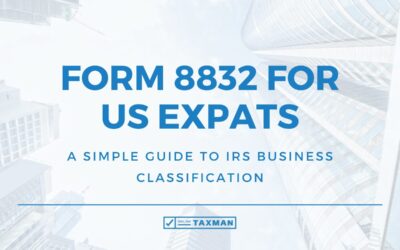Expat Tax Guide For Americans Living in Germany

Did you know that over 100,000 American expats live in Germany? It is a popular destination due to a strong economy, excellent public transport, a robust education system, and of course… beautiful scenery, rich culture, and fantastic festivals, to name a few. Moving from the US to Germany is an exciting adventure. Nonetheless, be mindful of taxes, both US tax and German tax for Americans in Germany.
US taxes and reporting obligations can be complex for Americans abroad. Although this article provides a comprehensive guide to help you understand taxation when living in Deutschland, each situation is unique. You can schedule a consultation with one of our expat tax professionals to ensure your specific tax needs are covered.
This article will cover the top 10 things you need to know about US expat tax when moving to Germany:
- 1. Do I have to file a US tax return if I live in Germany?
- 2. Tax benefits for Americans living in Germany
- 3. Foreign Tax Credits vs. FEIE – Which is better for expats in Germany?
- 4. Do Americans have to pay German taxes?
- 5. How do taxes work in Germany?
- 6. Unique German Taxes: Solidarity Surcharge and Church Tax
- 7. US-Germany Tax Treaty
- 8. US & Germany Totalization Agreement
- 9. Tax implications of owning a business in Germany as an American
- 10. How to file US taxes from Germany?
1. Do I have to file a US tax return if I live in Germany?
You may wonder where you need to file your taxes from now as a US expat living in Germany – Germany, the US, or both. The short answer is, typically, both.
Moving abroad does not excuse US citizens and green card holders from filing their taxes in the US if they meet the tax filing thresholds. Check out our Guide to US Expat Taxes.
Also, most expats must file additional US tax forms such as FinCEN Form 1114 (most known as the FBAR) and Form 8938. These are informational forms to report your specified foreign assets to the US, including your foreign bank accounts, pensions, and securities accounts held in non-US institutions.
While both forms are similar, there are a couple of notable differences. You must file the FBAR with the Treasury Department if the aggregate value of your non-US financial accounts exceeds $10,000 during the year.
On the other hand, you must attach Form 8938 to your tax return if the value of your foreign assets is $200,000 or more ($400,000 if you are married and filing jointly). You must also disclose additional assets in the 8938, such as foreign mutual funds.
No tax will be due upon filing an FBAR or Form 8938. However, failure to file or file incorrectly may result in severe penalties.
2. Tax benefits for Americans living in Germany
Few jurisdictions in the world tax their citizens and permanent residents living abroad on their worldwide income. Unfortunately, the US is part of the ‘’unique group’’.
The good news is, as a US person living abroad, you can avoid double taxation and lower your US tax bill by benefitting from one of the following:
Foreign Earned Income Exclusion (FEIE)
The Foreign Earned Income Exclusion (FEIE) is a great advantage for expats as they can exclude $126,500 in earned income (in 2024, $130,000 in 2025) from US income tax. Married couples filing jointly and living abroad can exclude double this amount. The exclusion increases every year as it adjusts for inflation.
To qualify, you must become a bona fide resident of Germany or spend at least 330 days out of the US for twelve consecutive months. Please also note that the FEIE applies exclusively to earned income. You cannot deduct income from passive sources such as interest, dividends, or rental income. So the FEIE can benefit US citizens that work in Germany.
Foreign Housing Exclusion or Deduction
The cost of living in Germany can be high, especially in cities such as Munich or Berlin. Make sure you keep track of your household’s expenses, as you can qualify for an additional income exclusion!
Under the Foreign Housing Exclusion, expats can deduct certain household expenses from their taxable income. These include rent, utility bills (e.g., gas and electricity), parking, and furniture rental fees.
The limit on housing expenses depends on where you are living in Germany. For instance, if you live in Cologne, you can take up to $41,100 on housing expenses (in 2024). The exclusion may also change annually.
Foreign Tax Credit (FTC)
Another excellent benefit for expats is that they can take a credit in the US for taxes imposed by a foreign country. The Foreign Tax Credit is most beneficial for those who live in high-income tax-rate countries, such as Germany. So you can take a credit on your US tax return for German taxes you paid.
And the good thing is that these are not limited to earned income. You can use foreign tax credits against wages, interest, dividends, royalties, and other types of income, such as rental income.
3. Foreign Tax Credits vs. FEIE – Which is better for expats in Germany?
The answer has to do with the US vs German tax rates. Let’s go through a simple example and do some quick math, so it is easier to understand.
Let’s say that you moved to Germany in January 2022 for work. You earned $100,000 during the year and paid $30,000 in German taxes. As mentioned earlier, you must file a US tax return if you live and work abroad. By doing so, you find out that your 2024 US tax liability is $20,000.
You could use the Foreign Earned Income Exclusion and exclude the entire $100,000 from US income tax.
Alternatively, you can take a foreign tax credit in the US for your taxes paid in Germany.
The credit is not refundable, meaning you cannot take a higher credit than the tax you would owe in the US. The maximum credit you could take in the US in this example would be $20,000. You would carry over the $10,000 remaining to future years and can use it against potential future US taxes.
The Foreign Tax Credit is usually the better option for US expats in Germany as the German tax rate is much higher than the US.
Another benefit of using the Foreign Tax Credit instead of excluding all your income under the FEIE is that you can still make an IRA contribution. Using the FEIE can limit your ability to contribute to IRAs.

In certain situations, expats can combine the Foreign Tax Credit and the Foreign Earned Income Exclusion for more significant savings. Again, each case needs special consideration.
Be aware that you cannot take a tax credit against the income you excluded using the FEIE. An experienced tax accountant can help you file correctly.
4. Do Americans have to pay German taxes?
Germany taxes its residents on their worldwide income. Non-residents, however, will be taxed on German-generated income only. So, you might wonder whether you are a German tax resident.
If your habitual abode is in Germany, and you intend to stay or are physically present in the country for over six months, you will be considered a German tax resident. Therefore, you must file a German tax return, in addition to your US return.
If you don’t have ties to the country, such as financial assets or a primary residence, your tax residence will end when you leave the country.
Depending on your purpose in moving to the country and how long you intend to stay, you may apply for a residence permit. For shorter stays, you can get a temporary residence permit or an EU blue card if you qualify. If you intend to make Germany your permanent home, you can get a Permanent Residence Permit, also called a Settlement Permit.
Also, it is worth mentioning that Germany is currently developing its immigration law as it considers allowing dual or multiple German citizenships. This means that migrants with non-EU nationality will be able to become German residents without renouncing their original citizenship.
5. How do taxes work in Germany?
As you establish your new life in Germany, you should familiarize yourself with the German tax system. While we provide a brief overview of taxes in Germany, please note that we are not experts in German taxes. For Germany-specific tax advice, please consult a German tax professional.
Once you arrive in Germany and register at their citizen’s office, you will receive a tax ID number. The Tax authority in Germany is the Federal Ministry of Finance (Bundeszentralamt für Steuern). You may want to navigate their website as it provides some helpful information.
Germany’s tax season matches that of the US as it follows the calendar year – January 1st through December 31st. This is ideal to benefit from the foreign tax credit and reconcile the taxes payable in both countries.
How much tax you will pay in Germany depends on your yearly income and on which of the six German tax classes you are categorized into. Your German tax class depends on your marital status or number of employments, among other factors.
In 2022, the first 9,408 EUR of your total income will be tax-free. The tax rate then starts at 14% and increases in brackets to 45% for the highest earners (those who make over 270,501 EUR).
Compared to German grammar and declining articles, taxes are typically straightforward for employed individuals in Germany, as it has a ‘’withholding at source’’ tax system. This means your employer automatically deducts taxes each month from your payslip. In fact, many employees usually do not have to file a tax return. But they still choose to do so as they might be able to get a refund.
If you are a freelancer or self-employed, you will be responsible for calculating your taxes based on how much you have earned during the year and pay your income tax in advance quarterly.
6. Unique German Taxes: Solidarity Surcharge and Church Tax
In addition to income tax and social security contributions, there are other taxes in Germany you might want to be aware of:
- Solidarity surcharge (“Soli”)
- Church or worship tax
- Dog tax (yep, you get taxed for having a dog in Germany)
- VAT
- Corporate tax
- Trade taxes
Typically, expats in Germany will encounter the Soli and the church tax, so we explain those a bit more.
Germany imposes a 5.5.% solidarity surcharge on the income tax liability of all taxpayers. The solidarity tax is also imposed on capital gains and corporate taxes.
If you are part of a religious organization, you will also be subject to church tax. The church tax ranges between 8% and 9% of your total liability depending on which state you reside in.
The advantage is that you can take a foreign tax credit in the US for the solidarity surcharge and church tax in Germany as the IRS considers both income tax.
The Tax Treaty, Revenue Ruling 74-90 specifically states: ‘’Both the income taxes and surcharges on the income taxes imposed under Federal Republic of German laws on individuals and corporations are creditable taxes for purposes of the foreign tax credit under IRC Section 901 of the Code.”
7. US-Germany Tax Treaty
In simple terms, a tax treaty is an agreement between two countries to minimize or eliminate double taxation. The US-Germany Tax Treaty covers income tax, corporation tax, and capital gains tax.
The tax treaty will outline matters such as which country has the right to tax certain types of income, in which country the taxpayer is considered a resident, what type of income can be exempt from taxes, and so on.
For example, the Treaty states that interest income is taxed in the country where the taxpayer resides, no matter where the income is sourced.
It also provides special rules for specific individuals. For example, students or professors based in Germany for less than two years are only subject to US income tax.
The double tax treaty between US and Germany is extensive and can be complicated to understand. A careful analysis of each expat’s unique tax situation and long-term plan is crucial.
8. US & Germany Totalization Agreement
Unlike the Tax Treaty, the US-Germany Totalization agreement focuses specifically on social security taxes. Its primary purpose is to prevent US expats in Germany from paying social security taxes on the same earnings to both countries.
If your US employer sends you to Germany for five years or less, your employer will continue to pay US Social Security taxes. Therefore, you won’t have to pay into the German social security system.
Once you’ve determined where to remit social tax, you’ll need to obtain a certificate of coverage issued by Germany. This serves as proof of exemption from social tax on the same income. The German tax office can issue a ‘’certificate of coverage’’, which states that you pay into the German social tax system.
For example, if you are self-employed, this would enable you to avoid the 15.3% self-employment taxes in the US due to the agreement between the two countries. The 15.3% is in addition to the income tax. You cannot reduce self-employment tax by using foreign tax credits or the foreign earned income exclusion so you must get the certificate.
9. Tax implications of owning a business in Germany as an American
As an American entrepreneur abroad, you have to deal with both US and foreign taxes. (We wrote an in-depth tax guide for entrepreneurs. )
You will have to pay German corporation tax if your corporation is managed in Germany or registered in a German office. Corporation tax in Germany is levied at a uniform tax rate of 15%. A solidarity surcharge tax of 5.5% also applies here. Again, you will be able to take a credit in the US for the taxes you pay in Germany.
Something that US expats in Germany often miss is that, upon owning 10% or more of a foreign corporation (either directly or indirectly), they have additional filing requirements in the US. That’s right… more forms to be filed!
If you are an officer, a director, or a shareholder of a German company and you own 10% or more, you must file Form 5471 in the US. Reporting requirements get more complex and extensive when the ownership of the foreign corporation exceeds 50%. The corporation is then treated as what’s called a ”Controlled Foreign Corporation” (CFC).
A CFC is a foreign corporation that is more than 50% owned by US shareholders. Controlled Foreign Corporations that make a profit during the year are subject to the Global intangible low-taxed income or ”GILTI tax” in the US. These are complex terminologies that can get as difficult as the form itself.
Form 5471 is an informational return. However, the IRS imposes heavy penalties for failure to file the form or filing it incorrectly. Make sure you don’t miss this!
10. How to file US taxes from Germany?
As you may realize by now, there are many different aspects to consider as an American expat in Germany. Before making significant financial or tax decisions, you should inform yourself of the potential US tax consequences and speak with an expert.
As a popular quote says, ‘’it’s easy to make things look hard, but hard to make things look easy’’. Indeed, Online Taxman is committed to working hard and making US taxes easy for expats and international entrepreneurs. We have extensive experience working with Americans in Germany.
Get in touch today – do not hesitate!
Ready to seek assistance with your US taxes?

Vincenzo Villamena, CPA
Stay Informed With The Online Taxman Newsletter
Your Title Goes Here
Text goes here






